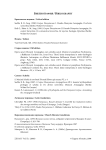Статьи журнала - Schole. Философское антиковедение и классическая традиция
Все статьи: 593
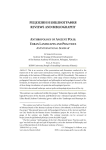
Anthropology of ancient polis: urban landscapes and practices. An international seminar
Статья обзорная
This is an overview of the presentations and discussions conducted in the framework of the same-name international seminar, organized by the department of philosophy of the Institute of philosophy and law SB RAS (Novosibirsk). This seminar is the second in a series of seminars where a wide range of issues relating to historical-pedagogical, historical-archaeological, and philosophical-anthropological research of the formation, development and evolution of urban educational spaces are discussed, each of them being a localization of a particular anthropological practice.
Бесплатно
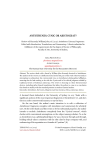
Antisthenes: cynic or aristocrat?
Рецензия
Review of: Kennedy, William John, ed. (2017) Antisthenes' Literary Fragments: Edited with Introduction, Translations, and Commentary. A thesis submitted in fulfilment of the requirements for the degree of Doctor of Philosophy. Faculty of Arts, University of Sydney. (https://ses.library.usyd.edu.au/bitstream/2123/16595/1/Kennedy_WJ_Thesis%20Final.pdf). The review deals with a thesis by William John Kennedy devoted to Antisthenes. The authors of the review are chiefly interested in the first part of the work where Kennedy is attempting to substantiate his controversial view on Antisthenes' philosophical affiliation, asserting that he had nothing to do with the Cynics and in his ethical judgment abided by traditional tenets of Athenian aristocracy. The review is focusing on those hermeneutical devices, including rather biased translations that allow the author to come to a conclusion that breaks so starkly with the standard position in modern Classical studies.
Бесплатно
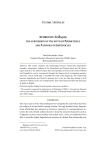
Aphrodite : the subversion of the myth of Prometheus and Pandora in Empedocles
Статья научная
This article examines the relationship between Hesiod and Empedocles through a comparative analysis of the Prometheus and Pandora myth and the Queen Cypris narrative. The author sustains that correspondences between the works of Hesiod and Empedocles can be interpreted through the framework of overlapping narrative structures, which would help to establish the order of the fragments. The relationship between Empedocles and Hesiod is polemic due to the fact that they belong to rival schools of wisdom. In the case of Empedocles, that school emanated from the Sanctuary of Apollo in Delphi.
Бесплатно
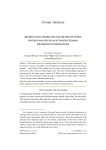
Статья научная
The article serves as a starting point for a research project dedicated to the dichotomy of private and public, and its implications and dynamics in the late Roman republic - early Empire. The primary focus is on the roman private spaces in the villas and houses of the Vesuvian archaeological area. The main methodological approach is represented by the ‘space syntax” theory of B. Hillier and the “movement as memory” theory of D. Favro developed within the logics of Spatial Turn studies, further refined by A. Russel in her works on Roman public space.
Бесплатно
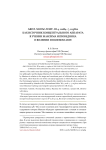
Статья научная
В статье исследуется учение византийского философа и богослова Максима Исповедника (c. 580-662) о воле и волевом акте. Анализируется группа понятий, содержание которых Максим обсуждает применительно к этапам и составляющим процесса воления. Показано, что сердцевину понятийного аппарата, на основе которого Максим, вовлеченный в христологическую полемику с монофелитами, строит свое учение о воле, составляют термины, обсуждаемые Аристотелем в «Никомаховой этике» III, 4, 1111b 4 - 7, 1113b 22. Также реконструируется учение Максима о естественной и избирательной волях человека.
Бесплатно
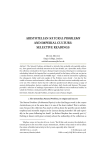
Aristotelian natural problems and Imperial culture: selective readings
Статья научная
The Natural Problems, attributed to Aristotle (but probably only partially authentic), have gained much scholarly attention in the last decades, yet a systematic study of how the collection circulated in the Graeco-Roman Empire remains a blind spot in contemporary scholarship. Indeed, the Imperial Era is a seminal period for the history of the text, not just as a conduit between Aristotle and the Middle Ages - which in itself is essential for explaining the subsequent Arabic and Latin uptake of the Problems more clearly - but also for the wealth of sources and testimonies it offers about the collection’s ancient readership and concrete use. The evidence shows that the collection sparked much debate among a range of ancient philosophers, doctors, sophists and scholars, both Greeks and Romans. This paper provides a selection of readings representative of the different socio-intellectual milieus in which the Problems circulated and the different agendas that it served.
Бесплатно
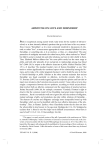
Aristotle on love and friendship
Статья научная
David Constant (Brown University, Providence, USA) presents a small paper entitled "Aristotle on Love and Friendship," in which he shows that, contrary to the opinion of many ancient scholars, the term philia in Aristotle means selective and effective relations between people, and not ties like kinship, conditioned by reciprocal obligations and not assuming an effective element as an essential characteristic. In addition, the author solves the ambiguity problem of the word philia, which can mean both "love" and mutual affection, characteristic of friendship.
Бесплатно
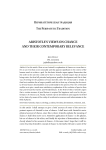
Aristotle’s views on chance and their contemporary relevance
Статья научная
In this article I first set out Aristotle's explanation of chance as a term that refers to an event that occurs unusually and that appears significant in the context of the human search to achieve a goal. On this basis Aristotle argues against Democritus that the order in the universe could not be due to chance. Aristotle argues that all natural beings strive for their full potential and greatest possible development, and this is their way of striving for the goodness of God. And they strive for survival and to remain in their best condition for as long as possible, and this is their way of striving for the eternity of God. Chance abnormalities occur accidentally in this process. This view of Aristotle enables us to give a much more satisfactory explanation of the evolution of species than that put forward by Darwin and Neodarwinians. In the field of ethics Aristotle argues that a certain measure of good fortune is required for happiness and even for the performance of virtuous acts. Finally, Aristotle rejects determinism and supports his belief in free choice by means of the reality of accidental occurrences and indeterminism in the field of physics
Бесплатно
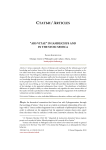
Ars vitae in iamblichus and in the stoic Seneca
Статья научная
Seneca expounds a theory of therapy and teaching with the ultimate goal of self knowledge and wisdom. Some of his techniques are based on Pythagorean principles or derive ideas from them, among them the focused and constant ascesis of self control. Iamblichus in De Vita Pythagorica exhibits great interest on the fact that mans inherent abilities along with the aid of proper education suffice for his attainment of wisdom. For both thinkers, knowledge through practice is considered to be one of the major philosophical demands in the perspective of an ars vitae. The human being has to canalize himself into the modeling of a new way of living, an art of living which will contribute decisively to the fulfillment of his teleology, to his perpetual eudaimonia (bene vivere). The admittance of individual differences in peoples ability to reform themselves only signifies the more intense effort of the teacher towards a purification of their intellect and greater engagement of the individuals volition but not their inability for correction.
Бесплатно
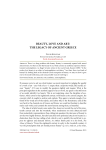
Beauty, love and art: the legacy of ancient Greece
Статья научная
There is a deep problem with beauty. Beauty is commonly equated with sexual attractiveness. Yet there is also the beauty of art, which arouses an aesthetic response of disinterested contemplation. As Roger Scruton writes in his recent book, Beauty (2009): “In the realm of art beauty is an object of contemplation, not desire.” Are there, then, two kinds of beauty? By looking back at the classical Greek conception of beauty, we may see how it gave rise to the modern dilemma, and some possible ways of resolving it.
Бесплатно
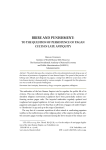
Bribe and punishment: to the question of persistence of pagan cults in late antiquity
Статья научная
In this article, the corruption of the state apparatus and the clergy of the late Roman Empire is seen as one of the factors of the prolonged preservation of paganism in the Christian empire. A number of examples illustrating the facts of giving bribes to pagans in order to preserve their rights to the administration of ancient cults in the provinces of Thebaida, Egypt, Phenicia of Lebanon, Palestine, Osroena, Sardinia in the 4th-6th centuries are cited. The article suggests that this phenomenon was a consequence of the approval of the institution of suffragia.
Бесплатно
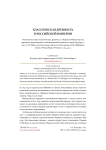
Classical antiquity in the Russian empire
Рецензия
A review on an annotated bibliography of the works dedicated to Antiquity, published in the Zhurnal ministerstva narodnogo prosveshcheniya from 1834 to 1917, prefaced, collected and annotated by A. I. Ruban and E. Yu. Basargina. St. Petersburg, 2015.
Бесплатно
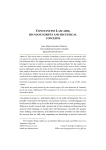
Constantine Lascaris, his manuscripts and his ethical concerns
Статья научная
This article aims to examine Constantine Lascaris’s work on Aristoteles’ ethical corpus. We consider evidence from the textual witnesses of the Nicomachean Ethics, the Eudemian Ethics, the Magna Moralia, and some other minor ethical writings, which belonged to Lascaris, in order to reconstruct his working methods. We also explore Lascaris’ own statements about virtuous life; a life devoted to the service of the common good, to philosophy and to the study of texts. For him philosophy was a way of life, rather than simply a discourse. We look at the link between written culture and philosophical life and propose further research into how Byzantine and Renaissance scholars understood their own intellectual activities to be a special kind of spiritual exercise intended to promote moral improvement in both individuals and societies.
Бесплатно
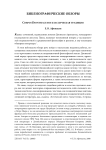
Corpus Dionysiacum и классическая традиция
Статья обзорная
Два библиографических обзора, посвященные Дионисийскому корпусу . В первом обзоре кратко рассматриваются недавние работы, посвященные проблеме неоплатонических источников корпуса. Эта тема будет продолжена в следующем выпуске. Во втором обзоре дается очерк славянской традиции бытования корпуса. Этот текст публикуется по-английски, поскольку до настоящего времени не выходило ни одной обобщающей работы по этой теме на английском языке.Two bibliographic summaries are dedicated, respectively, to the Dionysian corpus and the classical tradition and Dionysius the Areopagite in the context of Byzantine-Slavonic literary relations. The former outline is in Russian and it will be continued in the next issue (this time focused in the Christian sources of Pseudo-Dionysius), while the latter is prepared in English, since no detailed outline of this subject is available in English so far.
Бесплатно
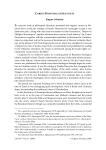
Статья обзорная
Two bibliographic summaries are dedicated, respectively, to the Dionysian corpus and the classical tradition and Dionysius the Areopagite in the context of Byzantine-Slavonic literary relations. The former outline is in Russian and it will be continued in the next issue (this time focused in the Christian sources of Pseudo-Dionysius), while the latter is prepared in English, since no detailed outline of this subject is available in English so far.
Бесплатно
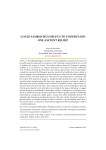
Could Iamblichus help us to understand one ancient relief?
Статья научная
Describing Pythagoras’ activities in Croton Iamblichus summarizes the content of his public speeches addressed to young men, to the Thousand who governed the city, as well as children and women of Croton. The earliest evidences about the Pythagoras’ speeches, available to us are found in an Athenian rhetorician and a pupil of Socrates Antisthenes (450-370 BCE), the historians Dicearchus and Timaeus, and Isocrates. In the present paper I consider the content of the Pythagoras’ speeches, preserved by Iamblichus, in more details, in order to suggest a new interpretation of the famous grave relief from the Antikensammlung, Berlin (Sk 1462). The relief, found in an “Olive grove on the road to Eleusis” and dated to the first century BCE, presents an image of a sitting half-naked bearded man with a young man, also half-naked, standing behind his chair, and a group of peoples consisting of a child, an older man and a woman, standing in front of him. Our attention attracts a big and clear image of the letter ‘Psi’ above the scene. The comparison of the content of Pythagoras’ speeches with the scene depicted on the relief allows us to interpret the image as following: we suggest that the sitting man, undoubtedly a philosopher, could be a Pythagorean or Pythagoras himself; he is attended by his pupil and gives speeches to different groups of peoples, symbolically represented as a young man, a public agent, a woman and a child. Admittedly, the letter ‘Psi’ symbolizes the Pythagorean teaching about psyche (the soul), and the relief itself, contrary to general opinion, was initially designed to adorn a school or a private building rather than a funeral monument. An alternative interpretation suggested is that the sitting figure could be a wandering physician.
Бесплатно
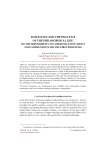
Статья научная
This paper is an overview and introduction to the key elements of Damascius’ philosophy. I examine the attributes and the relationship between the Ineffable, the One, and the All as the cornerstones of his theoretical system. I then investigate the role of this system of thought for Damascius and his contemporaries as a guide to the philosophical life and its repercussions for attaining the highest principles. Is contemplation possible or are other means needed, such as theurgy and purification of the soul? Does the philosopher occupy a privileged position in this system, as in the preceding Platonic tradition or is the philosopher’s position different, by the experience of void and the inability to speak about and grasp the ‘nothingness’ of the highest principles?
Бесплатно
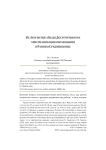
De arte metrica беды досточтимого и христианизация образования в раннем Средневековье
Статья научная
В статье показано, какие тексты христианских поэтов Беда Досточтимый использовал при написании De arte metrica , как он их цитировал и привлекал; демонстрируется, каким образом в образовательном процессе раннего Средневековья происходило вытеснение существующих норм классического стиха и их замена на христианские.
Бесплатно
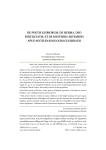
Статья научная
Статья завершает исследование эротического ритуала предсвадебных мистерий Артемиды в античной Митилене и его отображения в поэзии Сапфо и Алкея. Девушки-невесты либо новобрачные, проходя посвящение в мистерии Артемиды, приносили в жертву Артемиде свою девственность (ср.: Sapph. Fr. 99 (a-b), Sapph. Fr. 114 Campbell; SEG XX 717, 84-97; IG XII (2) 255; Ps.-Aeschin. 10 и др.). При этом старшие девушки в ходе этого ритуала, по-видимому, выступали в образе Гермеса, фаллического божества плодородия (ср. Sapph. Fr. 141, Sapph. Fr. 150 Campbell; TAM III/1 35, A1). В пользу такой интерпретации свидетельствует сопоставительный анализ данных археологии, эпиграфики и литературной традиции.
Бесплатно

